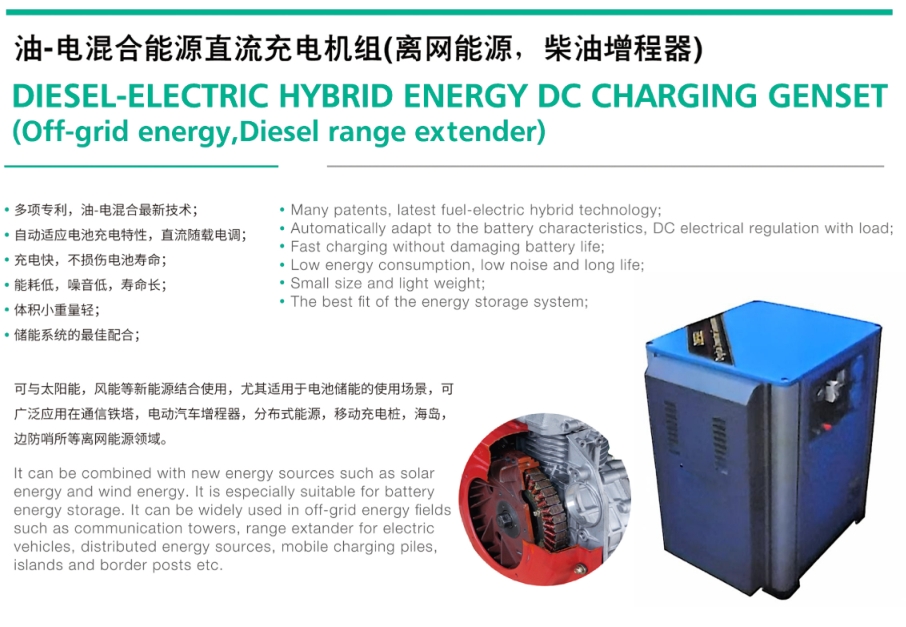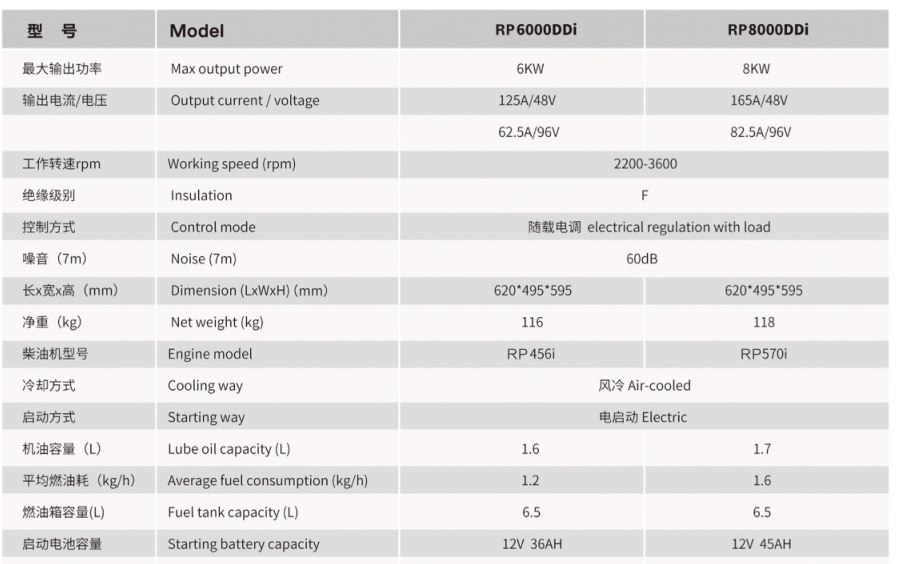DIESEL-ELECTRIC HYBRID ENERGY DC CHARGING GENSET (Off-grid energy,Diesel range extender)


What is the oil-electric hybrid energy DC charging unit (off-grid energy, diesel range extender)?
Oil-electric hybrid energy DC charging unit (off-grid energy, diesel range extender) is a kind of charging equipment that combines fuel and electricity energy sources. The following is a detailed explanation of it:
1. Operational principle
Diesel range extender
A diesel range extender is a small diesel generator. It generates mechanical energy by burning diesel energy, which then converts it into electricity.
When the external power supply is not available (off-grid state), the diesel range extender can start and generate power to provide power for the charging device.
Off-grid energy
Off-grid energy means that the charging unit can operate independently of the grid. In the absence of mains access, the unit relies on its own diesel range extender to generate electricity to work.
Oil-electric hybrid energy sources
The charging unit combines fuel (diesel) and electricity. You can use the mains for charging operation. When the mains is interrupted or unavailable, it will automatically switch to the power generation mode of diesel range extender to ensure the continuity of charging operation.
DC charging unit
A DC charging unit means that the device can output DC electricity. Compared with AC charging, DC charging has the advantage of fast charging speed, and it is usually used in fast charging scenarios, such as fast charging stations for electric vehicles.
2. Application scenarios
Charging in remote areas
In remote areas not covered by the power grid, such as mountainous areas and field construction sites, such charging units can provide charging services for electric equipment (such as electric vehicles, power tools, etc.).
Emergency charging
In the case of power failure caused by natural disasters or power grid failure, the oil-electric hybrid energy DC charging unit can be used as an emergency charging equipment to ensure the normal operation of important electric equipment.
3. Merit
Strong independence
Does not rely on the power grid and can operate independently in various environments.
High reliability
The diesel range extender provides a reliable backup power supply to ensure that the charging operation is not interrupted by a grid failure.
High charging efficiency
The DC charging function makes the charging speed fast and can meet the needs of users for quick charging.
In short, the oil-electric hybrid energy DC charging unit (off-grid energy, diesel range extender) is a powerful and widely used charging equipment, especially suitable for off-grid and emergency charging scenarios.
Compared with the traditional AC charging pile, what are the advantages of the oil-electric hybrid DC charging unit?
Compared with the traditional AC charging pile, the oil-electric hybrid energy DC charging unit has the following significant advantages:
1. Charging rate
DC charging
The oil-electric hybrid energy DC charging unit adopts DC charging technology, which can directly provide direct current for the batteries of electric vehicles. In contrast, the traditional AC charging pile output is alternating current, which needs to be converted from AC into direct current through the built-in charger in the vehicle to charge the battery.
DC charging eliminates the conversion process inside the vehicle, so the charging speed is greatly improved. In general, DC fast charging can charge about 80 percent of the electric car's battery in 30 minutes to two hours, while AC slow charging can take 6-8 hours or even longer.
2. Energy independence
Off-grid energy and diesel range extender
The oil-electric hybrid energy DC charging unit is equipped with an off-grid energy system and a diesel range extender. This means it can operate independently without mains access, relying on diesel power to charge the vehicle.
Traditional ac charging piles are entirely dependent on the grid and cannot work in grid failures, remote areas or insufficient power supply. The oil-electric hybrid unit can provide reliable charging services for vehicles in emergency situations or in areas covered without the grid.
3. Application scenario flexibility
Diversified scenarios
Due to the function of off-grid and diesel power generation, the oil-electric hybrid energy DC charging unit is suitable for a variety of scenarios, including remote mountainous areas, field work sites, temporary activity places, etc.
Traditional AC charging piles can only be installed in places with stable power grid access, and the application scenarios are greatly limited.
4. Reliability
Back up power
Diesel range extender, as a backup power supply, can guarantee the continuity of charging service when the power grid is blackout or unstable.
Traditional ac charging piles cannot work when they encounter power grid problems, which may bring inconvenience to users.
To sum up, the oil-electric hybrid DC charging unit has obvious advantages in terms of charging speed, energy independence, flexibility and reliability of application scenarios, which can better meet the diversified charging needs of users.








